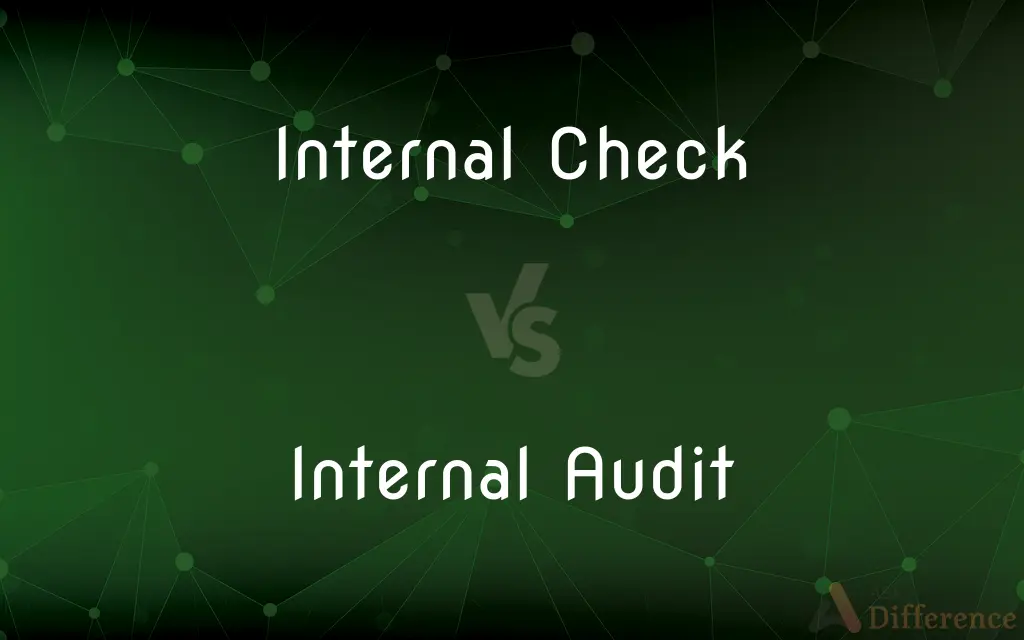Internal Check vs. Internal Audit — What's the Difference?
By Tayyaba Rehman — Published on October 31, 2023
Internal Check involves routine verifications in daily operations, while Internal Audit is a systematic review of an organization's procedures and performance.

Difference Between Internal Check and Internal Audit
Table of Contents
ADVERTISEMENT
Key Differences
Internal Check emphasizes regular checks embedded within the operational procedures of an organization. This system ensures that tasks are performed accurately and prevent errors or fraud. In contrast, Internal Audit is a broader and more structured approach, focusing on reviewing and assuring the effectiveness of risk management, control, and governance processes.
Daily operations in organizations employ Internal Check as a safeguard. It's like the checks and balances inbuilt within processes to flag discrepancies immediately. Meanwhile, Internal Audit acts like a periodic health check-up, delving deep into an organization's various functions to assure stakeholders of its operational integrity.
The proactive nature of Internal Check aids in the immediate detection of discrepancies or mistakes, minimizing risks on-the-spot. On the other hand, Internal Audit, with its holistic approach, provides recommendations for improvements after evaluating the entire organizational system.
While both Internal Check and Internal Audit aim to uphold the accuracy and integrity of operations, their methods and scopes differ. Internal Check is constant and operational, whereas Internal Audit is periodic and strategic.
Understanding the distinction between Internal Check and Internal Audit is crucial for organizations. The former offers real-time corrections while the latter ensures that the organization aligns with its objectives, compliance, and best practices.
ADVERTISEMENT
Comparison Chart
Purpose
Daily checks to ensure accurate operations.
Periodic review of organizational processes and performance.
Nature
Proactive and constant.
Systematic and periodic.
Scope
Limited to specific operational tasks.
Comprehensive, covering various functions.
Objective
Detect and prevent immediate errors or fraud.
Assess risk management, controls, and governance.
Outcome
Immediate corrections.
Recommendations for improvement and assurance to stakeholders.
Compare with Definitions
Internal Check
Constant safeguards within processes.
Every transaction undergoes an Internal Check for validity.
Internal Audit
Periodic assessment of procedural integrity.
The Internal Audit team will assess the financial department next month.
Internal Check
Mechanism to detect immediate errors or fraud.
The inventory system has an Internal Check to track discrepancies.
Internal Audit
Systematic review of an organization's functions.
The annual Internal Audit revealed areas for improvement.
Internal Check
Checks and balances within operational tasks.
Invoices undergo an Internal Check before approval.
Internal Audit
Examination of risk management and governance.
The latest Internal Audit highlighted the need for better cybersecurity measures.
Internal Check
Routine verifications within daily operations.
The cash register has an Internal Check to detect discrepancies.
Internal Audit
Holistic check-up of organizational health.
The CEO awaits the Internal Audit report to make informed decisions.
Internal Check
System to ensure operational accuracy.
Data entry has an Internal Check to prevent errors.
Internal Audit
Assurance of operational alignment with objectives.
Post Internal Audit, the company realigned its strategies.
Common Curiosities
What is the main goal of Internal Check?
Internal Check aims to ensure daily operational accuracy and prevent immediate errors or fraud.
How does Internal Audit differ from Internal Check?
While Internal Check focuses on daily operational checks, Internal Audit provides a systematic, periodic review of an organization's functions.
Is Internal Audit performed daily?
No, Internal Audit is usually performed periodically, not daily like Internal Check.
Who usually performs the Internal Audit?
An organization's internal audit department or external professionals conduct the Internal Audit.
Can an organization have both Internal Check and Internal Audit?
Yes, many organizations implement both for real-time checks and periodic reviews.
Can Internal Check prevent fraud?
While Internal Check aims to detect and prevent errors, it also aids in minimizing the potential for fraud.
Why is Internal Check important for daily operations?
Internal Check helps detect discrepancies immediately, ensuring accurate and efficient operations.
Who oversees the Internal Check processes?
Typically, department managers or supervisors oversee the Internal Check mechanisms in their respective domains.
Can Internal Audit recommendations be ignored?
While not mandatory, it's advisable to address Internal Audit recommendations to improve operations and reduce risks.
What tools are used for Internal Check?
Tools vary but can include software applications, checklists, or automated verifications.
Is Internal Audit only about financial review?
No, Internal Audit covers various functions, including operational, compliance, and risk assessments.
Which is broader in scope: Internal Check or Internal Audit?
Internal Audit has a broader scope, covering a comprehensive review of various organizational functions.
Is Internal Check a part of Internal Audit?
No, they're distinct, but both aim to ensure organizational integrity. Internal Check is continuous, while Internal Audit is periodic.
How often should companies conduct an Internal Audit?
The frequency varies, but many companies conduct Internal Audits annually or semi-annually, depending on their size and industry.
Do external stakeholders value Internal Audit results?
Yes, Internal Audit results provide stakeholders assurance regarding an organization's operational integrity and compliance.
Share Your Discovery

Previous Comparison
Audience vs. Spectators
Next Comparison
Thinking vs. Critical ThinkingAuthor Spotlight
Written by
Tayyaba RehmanTayyaba Rehman is a distinguished writer, currently serving as a primary contributor to askdifference.com. As a researcher in semantics and etymology, Tayyaba's passion for the complexity of languages and their distinctions has found a perfect home on the platform. Tayyaba delves into the intricacies of language, distinguishing between commonly confused words and phrases, thereby providing clarity for readers worldwide.
















































